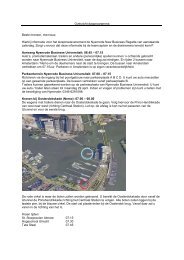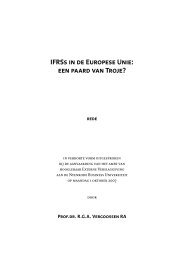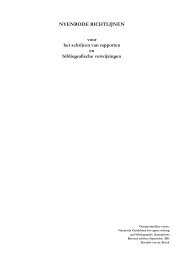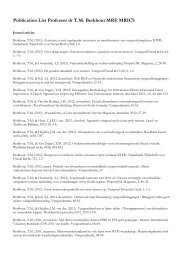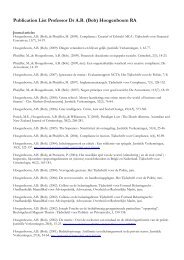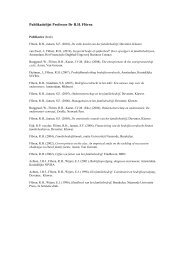pdf - Nyenrode Business Universiteit
pdf - Nyenrode Business Universiteit
pdf - Nyenrode Business Universiteit
You also want an ePaper? Increase the reach of your titles
YUMPU automatically turns print PDFs into web optimized ePapers that Google loves.
4.5. CONCLUSIONS AND DISCUSSION 113<br />
argues that RPE reduces the room for managerial opportunism by placing the standardsetting<br />
process outside the sphere of managerial influence. This study expected but did<br />
not find a negative relation between the use of RPE and the room that managers have to<br />
behave opportunistically. Instead, I find a positive relation between RPE-Use and RFMO.<br />
This finding is discussed in the next section.<br />
In addition to this unexpected result, the analyses do not support a RPE-increasing effect<br />
of information asymmetry. Although a positive relation was expected, the null result conforms<br />
to the findings of chapter 2. In chapter 2, increased levels of information asymmetry<br />
(moderated by the comparability of the business unit) did not result in more RPE use.<br />
Moreover, the analyses provide empirical evidence suggesting that a number of antecedents<br />
drive opportunistic behaviour. These antecedents include information asymmetry, goal<br />
ambiguity, measurability of the outputs, and decentralization of decision rights. These<br />
findings are largely robust over both analyses and may provide useful starting points for<br />
future research on opportunism-mitigating control instruments.<br />
4.5 Conclusions and Discussion<br />
This chapter studied the supposed opportunism-mitigating effect of RPE. Murphy (2001)<br />
claims that RPE reduces managerial opportunism by preventing managers from opportunistically<br />
influencing their own performance targets. The tendency to behave opportunistically<br />
is a central tenet in economics-based theorizing on Management Control. Opportunistic<br />
behaviour can significantly impact organizations. For example, if the members<br />
of the organization seek their own self-interest by shirking their duties or committing fraud,<br />
their behaviour will reduce the organizational gains. Additionally, opportunistically lowering<br />
the performance targets harms the organization’s ability to realize its objectives.<br />
Although the literature is concerned with opportunism, few empirical studies have directly<br />
assessed opportunism (Macher & Richman 2008). The current chapter fills this gap by<br />
empirically studying opportunism and the extent to which RPE reduces opportunistic behaviour.<br />
According to Murphy (2001), RPE reduces the room for managerial opportunism by determining<br />
the performance target outside the sphere of managerial influence. Doing so makes<br />
it more difficult for the manager to lower his target difficulty. This ‘external determination’<br />
renders an RPE-based performance target less vulnerable to managerial opportunism than<br />
the performance targets that are determined within the reach of the employee. Murphy’s





